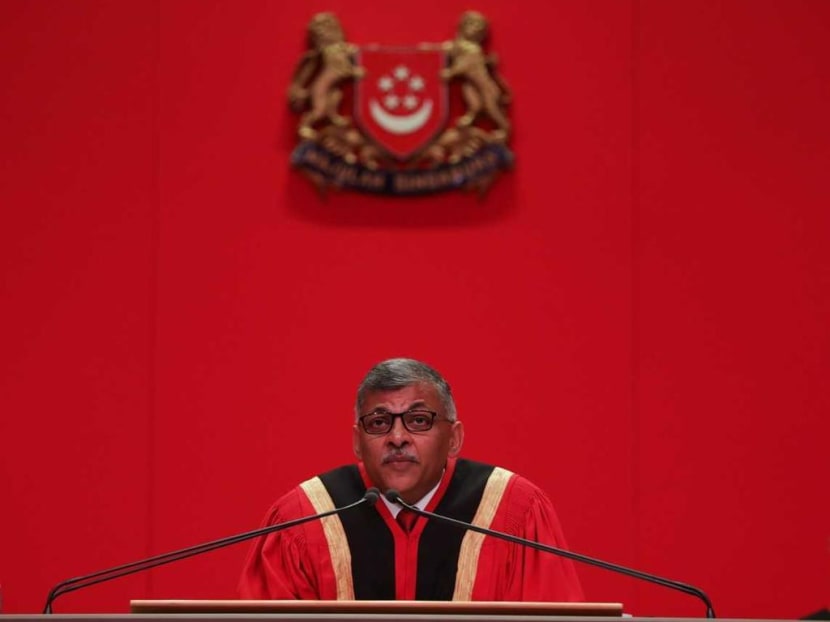Chief Justice urges new lawyers to do pro bono work, as pandemic reduces lower-income groups’ access to justice
SINGAPORE — The Covid-19 pandemic will have unequal effects on Singapore society and has already disproportionately reduced lower-income groups’ access to legal advice in countries such as the United Kingdom, Singapore’s top judge said on Tuesday (Aug 25).

Chief Justice Sundaresh Menon (pictured) said that new lawyers will have to be adept at arguing their cases remotely.
- Chief Justice Menon said that in other countries, the pandemic has affected lower-income groups’ access to legal advice
- He urged lawyers here to commit to pro bono work, which is now more critical than ever
- Mr Menon was speaking at a ceremony to call more than 500 lawyers to the Bar
SINGAPORE — The Covid-19 pandemic will have unequal effects on Singapore society and has already disproportionately reduced lower-income groups’ access to legal advice in countries such as the United Kingdom, Singapore’s top judge said on Tuesday (Aug 25).
To close the gaps in access to justice here, Chief Justice Sundaresh Menon encouraged new lawyers to commit to pro bono legal work, which he said is now more critical than ever.
Technology can provide solutions to remedy the unequal access to justice that, if left unfettered, will likely result in greater socio-economic inequality, he added.
Mr Menon was speaking at a ceremony to admit new lawyers to the Singapore Bar. The event was held online for the first time.
With clients cash-strapped from the pandemic-induced economic downturn, more people are also expected to demand lower legal fees, Mr Menon said. He urged the new generation of lawyers to devise innovative solutions to bring down costs.
“You are well-placed to offer fresh perspectives and creative ideas that may not occur to those of us accustomed to the old ways of doing things,” he said.
For the courts and the legal profession, the “most enduring legacy” of the coronavirus pandemic will be the dissolution of the long-held resistance to technology in some quarters, Mr Menon said.
“All around the world, court closures and the accompanying shift towards remote hearings have forced us to adopt changes that many in the profession have long been resistant to.”
These remote hearings, which began in April when Singapore imposed circuit breaker measures to restrict movement and activities, have today proven to be “feasible, convenient and effective”, Mr Menon said.
In arbitration hearings, especially for international cases, remote hearings could be the norm beyond the pandemic. New lawyers will have to be adept at arguing their cases remotely, he said.
On Tuesday and Wednesday, more than 500 lawyers are being called to the Bar over four Mass Call sessions, held over video-conferencing platform Zoom.
In his speech, Mr Menon listed lessons that lawyers can draw from the pandemic and urged the newly appointed advocates and solicitors to continue seeking ways to strengthen the legal process through technology.
NOT ALL DOOM AND GLOOM
In April, more than eight in 10 legal practitioners surveyed by the Singapore Academy of Law reported a drop in revenue and in new cases. Several law firms had to impose extensive pay cuts, a move that was not seen in previous crises.
The academy rolled out a S$1.9 million package in May for its members to take up skills development training, suspended the subscription fee of the LawNet legal research portal for two months, and waived business consultancy fees for small law firms.
A poll of the cohort of new lawyers found that 19 per cent were still searching for employment — a figure Mr Menon described as “concerning”.
But despite the doom and gloom, he highlighted several bright spots in the legal sector, such as in insolvency, contract negotiation and employment-related measures, which have seen surges in demand in recent months.
He gave an example of how during the 1997 Asian Financial Crisis, Singapore eschewed protectionism and accelerated plans to liberalise various sectors of the economy, including the legal sector.
“Partly as a result of that, our legal sector experienced immense growth in areas such as international arbitration, mediation, litigation, and specialised areas of transactional work, helping Singapore emerge as a leading hub for legal services,” he said.
Like past crises, the Covid-19 pandemic will pass and Singapore will emerge stronger than before, Mr Menon added.
“Those who stayed the course and displayed resilience and optimism today stand tall and proud of all we accomplished,” he said. “And it is that same spirit we must bring with us as we look ahead to envisage an even brighter future.”
Senior Counsel Gregory Vijayendran, president of the Law Society of Singapore, in his opening speech similarly urged the young lawyers not to let the current circumstances keep them in despair.
“Never believe for even one second that you are the Covid-19 generation, the lost generation or the generation that missed out,” he said.
“On the contrary, you are a generation of potential stars who are learning graduate-level resilience. That makes you a strong generation.”











